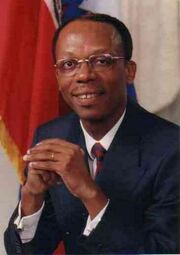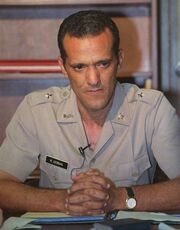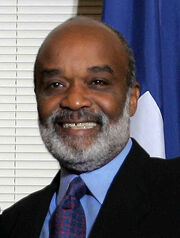"L'Union Fait La Force" | |||||
| Capital | Port-au-Prince | ||||
| Largest city | Port-au-Prince | ||||
| Language | French, Haitian Creole | ||||
| Government | Parliamentary republic | ||||
| President | Garry Conille | ||||
| Prime Minister | Jean-Max Bellerive | ||||
| Area | 27,751 km² | ||||
| Population | 10,033,000 | ||||
| Independence | 1804 | ||||
| Currency | Gourde | ||||
Haiti (pronounced /ˈheɪtiː/; French Haïti, pronounced: [a.iti]; Haitian Creole: Ayiti), officially the Republic of Haiti (République d'Haïti ; Repiblik Ayiti) is a Creole- and French-speaking Caribbean country. Along with the Dominican Republic, it occupies the island of Hispaniola, in the Greater Antillean archipelago.
History[]
Pre-Doomsday[]
From 1957 to 1983, the Duvalier family reigned as dictators, turning the country into a hermit kingdom with a personality cult and excessive corruption. They created the private army and terrorist death squads known as Tonton Macoutes. Many Haitians fled to exile in the United States and Canada, especially French-speaking Quebec. In the 1970s the United States funded major efforts to establish assembly plants for U.S. manufacturers. In the mid 1980s the US continued military and economic aid to the regime.
Post-Doomsday[]
Following the total breakdown of communications between Haiti and the United States, the country descended into chaos, lacking desperately needed foreign aid. The Duvalier family's grip on the country quickly started to crumble and in early 1984, they were ousted and a new constitution was overwhelmingly approved by the population. Jean-Bertrand Aristide, having returned in 1983 for his ordination as a Salesian priest, quickly took the reigns of the failing country and won a landslide victory in the presidential elections of 1984.
Aristide presidency (1984-1996)[]
Aristide was supported by most of the population, as he acted on a platform of survivalism and creating closer ties with regional powers that were emerging. He graciously received the aid given to him by the East Caribbean Federation. Over the years, political and military circles started losing hope in the President. Aristide developed an addiction to psychotropic drugs, and started murdering political opponents.
Wanting to grab power themselves, a military-junta, under the guidance of Raoul Cédras took power and threw the country farther into an economic crisis.

Jean-Bertrand Aristide
Civil war (1996-2002)[]
Aristide loyalists fought for supremacy against Cédras's forces for several years. Aristide was mainly supported by the "Cannibal Army", whose main base was in the city of Gonaïves.
Aristide forces were quick to seize the north of the country while Cédras controlled Artibonite province, controlling most of the roads in the province. The battle lines raged back and forth, with guerrilla warfare and bombings happening on both sides.

Raoul Cedras
In 1999, the Dominican Republic decided to intervene, sending Emmanuel Constant into the country, who organized a personal death squad, trying to undermine the actions of other involved parties. During the entire conflict, Haiti was unable to get any aid, as the ECF was unwilling to help. Relief finally came in the spring of 2002, as Latin American countries, which would later form the SAC , and the ECF and Cuba, sent peacekeeping forces into Haiti, who quickly struck a deal with Cédras to hold democratic elections. The Metayer brothers were quickly found, put on trial, and later convicted in September of 2002 for warcrimes, while Aristide was exiled and later decided to live in the Dominican Republic. Constant was not caught and also escaped into the Dominican Republic, whose government denies involvement to this day.

SAC soldiers in Port-au-Prince
Post civil war (2002-2010)[]
René Préval was elected president in early 2003 and was reelected in 2007. Aid has continued to be sent into Haiti by other Caribbean countries and peackeeping forces are still in the country. The military is still under the control of general Cédras and he has supported the current president throughout this time. The country remains suspicious of its neighbour the Dominican Republic and relations remain tense.
2010 earthquake[]
On January 12, 2010, at 21:53 UTC, Haiti was struck by a magnitude 7.0 earthquake, the country's most severe earthquake in over 200 years. The epicenter of the quake was just off the Haitian capital Port-au-Prince, sparking a tsunami watch for parts of the Caribbean. The peacekeeping forces headquarters, which were under the administration of the LoN from 2009, completely collapsed, killing 210 peacekeepers. The buildings of the finance ministry, the ministry of public works, the ministry of communication and culture, the Palace of Justice, the Superior Normal School, the National School of Administration, Parliament, and Port-au-Prince Cathedral were damaged to varying degrees.

Former president of Haiti, Rene Preval (2002-2010)
The biggest shock was the death of president René Préval and his family in the collapse of the National Palace which, together with the death of over 200,000 Haitians, threatens to once again destabilize the entire country. Jean-Max Bellerive, the prime minister of Haiti, is currently trying to keep his country together after the horrific aftermath of the quake, and will hold the title of president until general elections can be held. Bellerive held a ceremony commemorating all the victims of the earthquake as soon as the situation in the country stabilized, saying that the nation would rebuild with the help of "our charitable friends from abroad"
The LoN, which had supervised rebuilding efforts from the start, had decided to set up a committee in Haiti to further oversee development and make sure that the aid was being put to good use. This committee consisted of five members who are from various regional states who had offered strong support to Haiti's government. These nations are: Cuba, the ECF, Brazil, Mexico and Guyane. The committee also had a de facto sixth member in the form of the Haitian state headed by Bellerive, which has significant influence in the day-to-day rulings of the committee. There had been talk about the committee taking direct control of Haitian resources in the name of the LoN to directly manage rebuilding, but this never came to pass. The committee was officially dissolved on March 1st, 2012, which has been by excitement from the Haitian people.
Recovery[]
More than two years after the devastating earthquake that left many dead and even more homeless, Haiti has achieved some semblance of normalcy, as relief from LoN nations helped in its rebuilding. Some was raised by the international community, however, as Bellerive continued to hold both the offices of Prime Minister and President. But after a year, in 2012, he held general elections for the office of the President, with Garry Conille winning the presidency. The government has been stable since then, with both offices of government working tirelessly to rebuild the country after the recent disaster.
Economy[]
Haiti has remained the poorest country in the Americas. It is an impoverished country, one of the world's poorest and least developed. Comparative social and economic indicators show Haiti falling behind other low-income developing countries (particularly in the hemisphere) since the 1980s. About 80% of the population were estimated to be living in poverty in 2006. About 66% of all Haitians work in the agricultural sector, which consists mainly of small-scale subsistence farming, but this activity makes up only 30% of the GDP. The country has experienced little formal job creation over the past decade, although the informal economy is. Mangoes and coffee are two of Haiti's most important exports. Foreign aid makes up approximately 30%-40% of the national government's budget. The largest donor is the SAC followed by Siberia, and the ECF also contributes. Cuba also makes various contributions to Haiti's economy, especially after alliances were renewed in 2006 and 2007.
Demographics[]
Although Haiti averages approximately 360 people per sq km (940 per sq mi), its population is concentrated most heavily in urban areas, coastal plains, and valleys. 90-95% of Haitians (depending on the source) are of predominately African descent; the remaining 5-10% of the population are mostly of mixed-race background. A small percentage of the non-black population consist primarily of white Haitians; mostly of Arab, Western European (French, German, Polish, Spanish), and Jewish origin. Haitians of Asian descent (mostly of Chinese origin) number in at approximately 400.
International relations[]
Haiti is a member of the League of Nations. It maintains peaceful relations with its neighbors in the Caribbean, save for the Dominican Republic, which it distrusts due to its involvement in Haiti's civil war.
| |||||||||||
| ||||||||||||||||||||||



